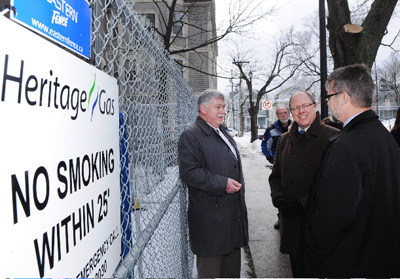 |
| Charlie Parker (left), minister of energy for Nova Scotia, chats with Ken Burt (centre) and Jim Bracken (right) beside the natural gas pipeline on Seymour Street (Danny Abriel photo) |
Celebrating gas on Valentine's Day may seem a bit counterintuitive, but that was exactly the case Monday morning as members of the provincial government, private industry and the HÂş» community came together to champion Dalâs official conversion to natural gas from Bunker C heating oil.
Provincial energy minister Charlie Parker as well as Rochelle Owen, director of the Office of Sustainability and Ken Burt, vice president finance and administration, were all in attendance at Mondayâs announcement.
The Province of Nova Scotia contributed funding towards the completion of the project.
Switching to natural gas, a cleaner-burning fuel, will significantly reduce HÂş»âs carbon footprint. Since the switch began in October of 2010, Dalâs sulphur emissions alone have been reduced by 35 per cent over 2001 levels. Carbon emissions have also been significantly reduced since the switch.
âHÂş» is an environmental leader, committed to sustainability and clean energy initiatives in our community,â says Mr. Burt. âWe believe that this conversion will immediately benefit the province, the city and our neighbours.â
In addition to the environmental benefits of switching to natural gas, there are also some financial benefits with the conversion. Natural gas is significantly cheaper than Bunker C oil with estimated savings in the first few months of operations of close to $1 million, according to Darrell Boutlier, director of operations with Facilities Management.
Heritage Natural Gas, a local company, is supplying the natural gas. The conversion makes HÂş» their largest customer which in turn supports the local economy through economic spin-off.
âSince activating in late October 2010, HÂş» has consumed 200,000 GJ (gigajoules) of natural gas," says Jim Bracken, president of Heritage Natural Gas. "With an estimated annual volume of 566,000 GJ, HÂş» will eliminate over 12,000 tonnes of greenhouse gas emissions, equivalent to the removal of 2,400 vehicles from our roads."
